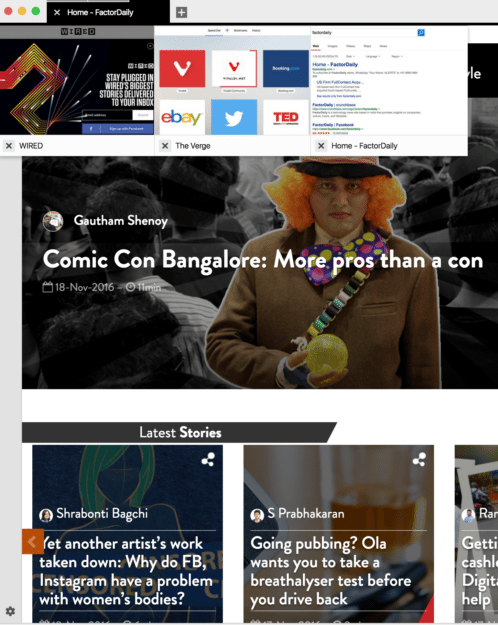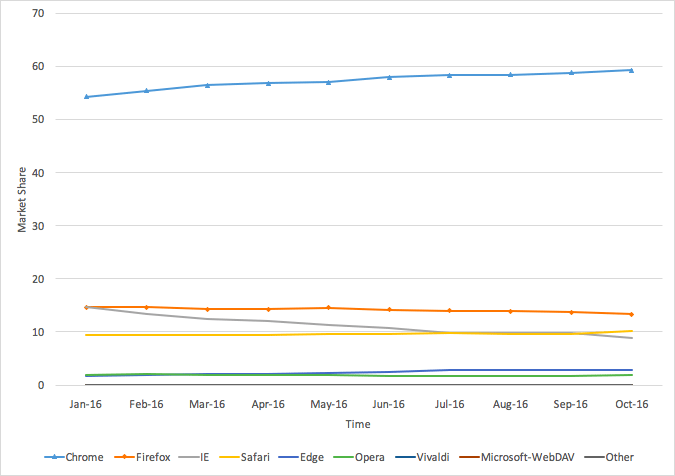Many web browsers have seen the light of the day but not all have survived the browser war. Until now, there have been only four that matter: Google Chrome, Mozilla Firefox, Microsoft Edge (Internet Explorer is being phased out) and Apple Safari.
A brand new web browser — Vivaldi — is trying to change the game. The brainchild of Jon Von Tetzchner, who gave us the Opera browser, the new browser is not for your average joe. It’s aimed at the power user and even comes with the tagline “Powerful and Personal.”
Vivaldi offers a highly customised and powerful browsing experience that will appeal to users who keep multiple tabs open and run many processes simultaneously, take notes and screengrabs while browsing, and like to configure their browser according to their tasks. It is a free, cross-platform browser that runs on Windows, Mac and Linux.
The trigger for Tetzchner developing Vivaldi was his dissatisfaction with the available browsers, which he feels are increasingly similar and stripped down. “There are a lot of people who do more than just watch videos on YouTube and Facebook. While a lot of other browsers are opting for simplicity, there are a lot of power users who feel left out,” Von Tetzchner told FactorDaily during his recent visit to India.
Vivaldi isn’t the only new entrant in the browser war. Many others are jumping into the fray with the promise of something new and unique. Former Mozilla CEO Brendan Eich, for one, is building a browser called Brave, which will automatically blocks ads and trackers to enable faster and safer browsing.
Vivaldi offers a customised and powerful browsing experience that will appeal to users who keep multiple tabs open and run many processes simultaneously, or take notes and screengrabs while browsing
Russian search giant Yandex is also building a new browser. Initially aimed at desktops, it will soon be available on mobile as Yandex is striking deals to export to Android phones. Arkady Volozh, CEO of Yandex, said in a statement in October: “To make the internet experience faster, easier and safer for everyone, we have built a cloud-based browser that integrates the best of our products and services and is open to other web developers.”
Microsoft, meanwhile, is replacing the iconic Internet Explorer with Edge in Windows 10 and Windows 10 mobile. Microsoft is building Edge from scratch and it’s not a revamped version of Internet Explorer. Edge doesn’t boast the power features of Vivaldi, but it’s a much faster and modern browser than good old Internet Explorer.
‘Powerful and Personal’
It may be raining browsers, but Vivaldi is confident it will stand out with its USP — interface customisation. The makers claim the browser offers customisation “beyond what has ever been offered in a Web browser.” “Vivaldi’s trademark is its customisability. It allows you to stack your tabs together,” said Von Tetzchner.
The Vivaldi download homepage positions it as a browser for its “friends”. It also urges users to “Get customising” with the browser. “We at Vivaldi believe in making software that lets you do things your way. We adapt to you! With Vivaldi you can customize the browser the way you want,” reads a message on the website.

Users can place browser tabs wherever they want — at the bottom or on the side of the window. They can choose a different location for the address bar. It also gives the user many options in terms of keyboard shortcuts, mouse gestures, appearance etc.
Apart from being personalised, Vivaldi also promises “the functionality you need and the flexibility you crave.” It is fast and user-friendly and compliant with all the web standards. Vivaldi was launched in November 2015.
Here are some of Vivaldi’s top customisation features that make for a “powerful” browsing experience.
- Tab Stacks is one of the coolest features of the browser. Often, one needs to have multiple tabs open simultaneously, which can get confusing. Tab Stacks allows the user to arrange multiple tabs in a folder-like fashion. For example, if you are browsing two sites — say Amazon and Flipkart — that you are likely to browse together, with this feature you can drop one tab on the other save it as a stack. You can also view two or more page at the same time.
- Vivaldi allows you to place your tabs as you like on any part of the screen. Apart from the traditional position at the top, you can place the tabs at the bottom or to the right or left.
- The browser will soon have a service called Vivaldi Sync, which allows users to synchronise their bookmarks, history, passwords and settings across different computers.
- It allows for customisation of the appearance of user interface elements such as the background colour, overall theme, address bar, etc.
- Vivaldi will offer delta updates, which means only the changes from release to release are downloaded, rather than the entire binary.
- The web panel feature allows users to view any site side by side. Users can visit multiple sites in the panel and view them at the same time. For example, if you’re browsing Facebook and Twitter, this feature would allow you to view them side by side.
In a first for browsers, Vivaldi will allow users of their browsers to control Internet of Things (IoT) enabled smart lighting. The browser will be integrated with Hue colour lights from Philips. After the user enables the Hue colour in Vivaldi theme settings, a tap on the Philips Hue Bridge( Also in the settings), the browser will synchronise your physical surroundings with the colour of the web.
“Imagine a world where your get notified for a new mail or web notifications through a light bulb,” explains Tetzchner.
Why a new browser?
So, why a new browser, and why now? Von Tetzchner explained to FactorDaily why he is taking on the biggies now. “Now is the right time to do it. I see Opera and other browsers disabling a lot of options, which is making browsing stagnant. This browser is developed for my friends and we are working hard to improve and deliver better features for the users,” he said.

There is no real way for companies to make direct revenue from web browsers — they make indirect revenue through ads, search royalties and through market penetration. Internet-focused companies like Google and Apple usually make browsers to get a window into how users use the net and to find ways to attract current users to their other offerings. But browser built by large companies leave much to be desired at the user’s end. For instance, Google and Safari don’t have in-built ad blockers. It doesn’t make business sense for them to install ad-blockers in their browser as it will hurt the company’s revenues from ads.
“This is what sets the stage for other developers to build browsers. Google Chrome is doing nothing about ad-blocking and they can’t. This allows for technological innovation for new browsers that can provide users the features they can’t,” said Kiran Jonnalagadda, co-founder of HasGeek, a tech conference company.
“Initially, these new browsers will provide these features despite making no revenues. But, in the coming days, they will have to figure out of other ways of making money,” added Jonnalagadda. Opera, for instance, comes with an inbuilt ad-blocker. Vivaldi doesn’t have one.
“What if I ask you, do you mind if I monitor your internet browsing behaviour? Would you be ok with that? We don’t want to monitor your computer as it’s your private space” — Jon Von Tetzchner
The new browsers also emphasise a lot more on security and privacy compared to their older, more established rivals. Vivaldi is built on the same open-source Chromium platform as Google Chrome, therefore it is vulnerable to all the security and privacy issues that Chrome has. But, Von Tetzchner and his team are working on features to make browsing more secure. Currently, Vivaldi only shows safe browsing warnings to the user.
It’s no secret that Google and Safari track their users’ web browsing. In fact, a user who is logged into their account can visit the “ad settings” page and see the profile Google has built for them based on their search history, YouTube history and interests. Not only that, in 2012, Google was found trampling over the privacy settings of Safari users! Vivaldi is working to ensure their users’ web browsing history remains private.
“What if I ask you, do you mind if I monitor your internet browsing behaviour and information? Would you be ok with that? We don’t want to monitor your computer as it’s your private space,” said Von Tetzchner, who plans to launch a full e-mail client by early 2017 and more privacy add-ons to the browser.
Subscribe to FactorDaily
Our daily brief keeps thousands of readers ahead of the curve. More signals, less noise.








